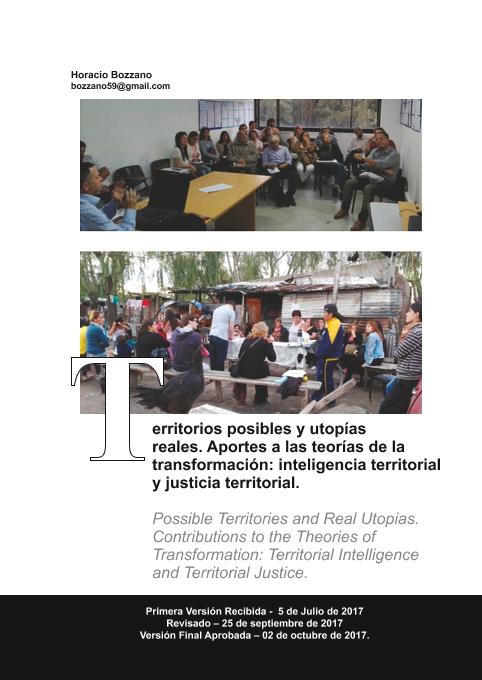Artículo
Este artículo de reflexión procura sintetizar la cuestión acerca de cómo la perspectiva epistemológica de territorios posibles aporta hace tres décadas en la construcción de Teorías de la Transformación. Se incluyen diálogos con la perspectiva de las utopías reales en Wrigth (2015). La hipótesis general plantea una fórmula básica entre la Gente y las Políticas Públicas para co-construir otro desarrollo: Territorios Posibles, Utopías Reales u otros conceptos, pero comprometiéndonos con la decisión de transformar nuestro mundo con las “patas de la mesa” de la Inteligencia Territorial latinoamericana: gente, científicos, políticos y empresarios. La fórmula se organiza teóricamente mediante cuatro hipótesis, se aplica con un método, Territorii, y se sostiene en resultados de un buen número de investigaciones ejecutadas desde 1984 y de otra en desarrollo desde 2014: el Proyecto PIO UNLP-CONICET “Gestión Integral del Territorio”. En el PIO dos Agendas Científicas operacionalizadas con Mesas de Trabajo permanentes vienen produciendo resultados concretos en materia de “Urbanizaciones Informales” y “Territorio-Industria-Ambiente” co-construyendo Poder y Políticas Públicas desde la Gente y la Ciencia con la participación de un actor que habla su propio idioma: el Ambiente. Participan siempre instituciones y empresas en el marco del sistema dominante en sus dos facetas: formalidad e informalidad. The aim of this reflective article is to summarize the question about how the epistemological perspective of possible territories is contributing to the construction of Theories of the Transformation, during three decades. In Addition it has been included dialogues with the perspective of the real utopias in Wright (2015). The general hypothesis proposes a basic formula between People and Public Policies in order to co-construct another development: Possible Territories, Real Utopias or other concepts, but committing ourselves to the decision of transforming our world with the “legs of the table” of Latin American Territorial Intelligence: people, scientists, politicians and businessmen. The formula is theoretically organized around four hypotheses, which is applied using a method, Territorii, and supported on results of a wide amount of researches, carried out since 1984 and another research about development from 2014 called: the PIO Project UNLP-CONICET “Integral Management of the Territory”. In this PIO, two Scientific Agenda have been operating by permanent work-tables have been producing concrete results in the subjects of “Informal Urbanizations” and “Territory-Industry-Environment”, cobuilding Power and Public Politics from People and Science with the participation of an own-language speaker actor: the Environment. Institutions and companies always participate in the dominant system´s framework in both facets: formality and informality.
Territorios posibles y utopías reales. Aportes a las teorías de la transformación: inteligencia territorial y justicia territorial
Título:
Possible Territories and Real Utopias. Contributions to the Theories of Transformation: Territorial Intelligence and Territorial Justice.
Fecha de publicación:
07/2017
Editorial:
Universidad Católica de Pereira
Revista:
Arquetipo
ISSN:
2215-9444
Idioma:
Español
Tipo de recurso:
Artículo publicado
Clasificación temática:
Resumen
Palabras clave:
Transformaciones
,
Utopias Reales
,
Territorios Posibles
,
Justicia Territorial
Archivos asociados
Licencia
Identificadores
Colecciones
Articulos(IDIHCS)
Articulos de INST.DE INVEST.EN HUMANIDADES Y CS SOCIALES
Articulos de INST.DE INVEST.EN HUMANIDADES Y CS SOCIALES
Citación
Bozzano, Horacio Rodolfo; Territorios posibles y utopías reales. Aportes a las teorías de la transformación: inteligencia territorial y justicia territorial; Universidad Católica de Pereira; Arquetipo; 15; 7-2017; 71-91
Compartir
Altmétricas
Items relacionados
Mostrando titulos relacionados por título, autor y tema.
-
Trucco, Ignacio Tomas ; Romano, Silvina Alejandra (Université Toulouse, 2016-12)
-
Casalderrey Zapata, Maria Constanza (Universidad de Los Lagos. Departamento de Estudios Sociales, 2017-07-11)
-
Mora Castillo, María Alejandra; Alvarez Manriquez, Lorena Vanesa (Universidad Pedagógica y Tecnológica de Colombia, 2021-01)




